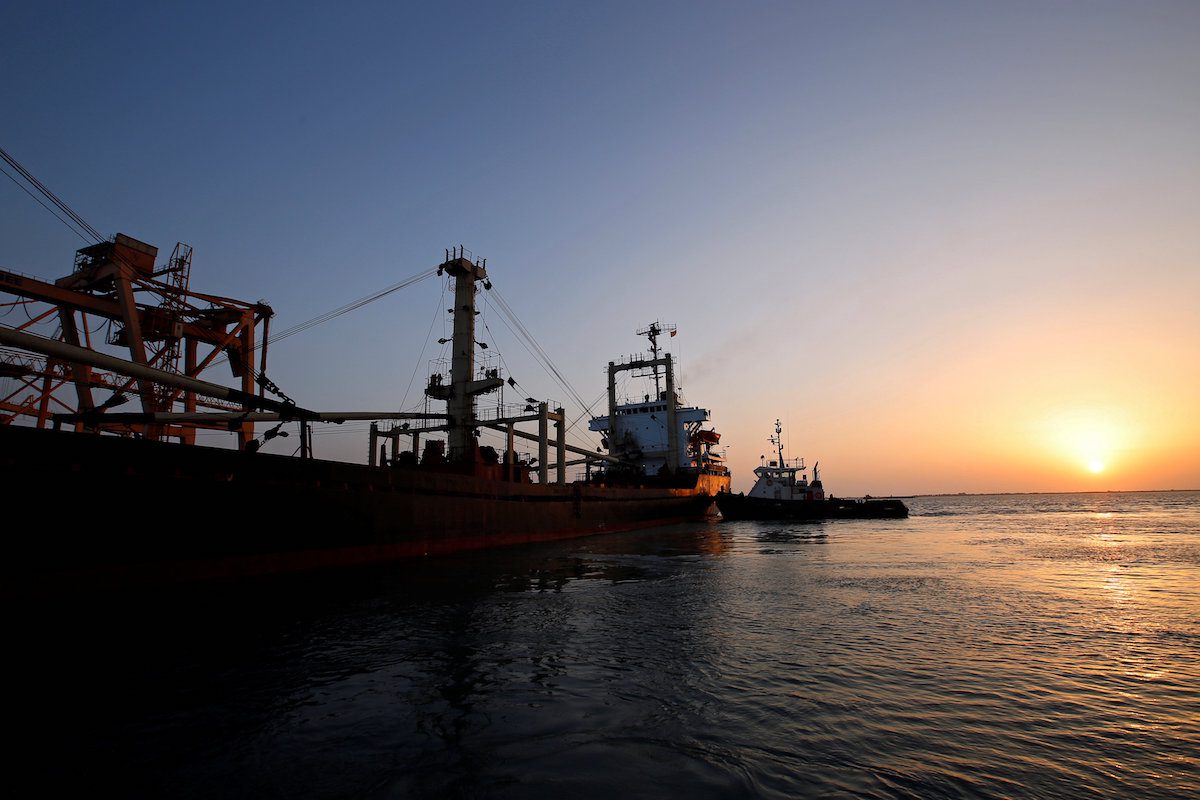A ship is seen at the Red Sea port of Hodeidah, Yemen November 26, 2017. Picture taken November 26, 2017. REUTERS/Abduljabbar Zeyad

By Jonathan Saul and Selam Gebrekidan LONDON, Dec 6 (Reuters) – No fuel shipments have reached Yemen’s largest port for a month, a Reuters analysis of port and ship tracking data shows, as a Saudi Arabian-led blockade on the war-torn country tightens despite international calls for the siege to end.
Tankers laden with oil have turned away from Hodeida, the biggest entry point for cargo to the devastated north, without unloading. The United Nations’ body tasked with inspecting ships seeking to enter the area said on Wednesday it could not say when such ships would be allowed through.
The shortage means areas hardest hit by war, malnutrition and cholera lack functioning hospital generators, cooking fuel and water pumps. It also makes it harder to move food and medical aid around the country. At least one in four people in the nation of 28 million is starving, according to the United Nations, as a three-year civil war, stoked by regional foes Saudi Arabia and Iran, rages on.
The United Nations and individual governments including Britain have urged Saudi Arabia over the past few weeks to loosen its blockade on Yemen’s northern Red Sea ports.
In a statement to Reuters, a spokesperson for the U.N. inspection body, the Verification and Inspection Mechanism for Yemen (UNVIM), said the Saudi-led coalition forces have refused tankers permission to enter Hodeida despite its approval, “and repeated attempts by the vessels to proceed … The coalition has repeatedly said their priority is food only.”
The coalition has turned away up to 12 tankers in recent weeks, the UNVIM spokesperson said, adding: “UNVIM is unable to say when the coalition will allow fuel tankers to enter Yemen’s Red Sea ports’ anchorage areas.”
Saudi Arabia and its allies, with the backing of the United States, first positioned warships in Yemeni waters in 2015. Since then, commercial shipments to Hodeida and other ports controlled by Iran-backed Houthi militia have suffered severe restrictions and delays.
In early November, after a Houthi ballistic missile was fired into Riyadh, Saudi Arabia blocked all Yemen’s ports, preventing any shipments – including humanitarian aid – from entering the country.
Since then, Riyadh has reopened southern ports, including Aden, which are under the control of the Saudi-backed internationally recognized government, and allowed humanitarian aid into Hodeida.
But the squeeze on commercial shipments to Hodeida has tightened.
According to Hodeida port records, Saudi-led military forces last month ordered at least six oil tankers to leave the port before unloading. Captain Mohammed Ishaq, executive chairman of the Yemen Red Sea Ports Corporation, which operates Hodeida, told Reuters on Tuesday no fuel shipments had reached the port since Nov. 6.
The International Committee of the Red Cross warned last week that water systems in nine cities including Hodeida had run out of fuel stocks. Since then, “as a last resort,” it said it has supplied fuel to the water authorities of Hodeida and Taiz to help provide clean water to over one million people, as well as to several hospitals in the embattled capital of Sanaa.
A spokesman for the Saudi coalition could not be reached for comment.
Saudi Foreign Minister Adel al-Jubeir told Reuters last month that no country in the world had provided more aid to Yemen than Saudi Arabia. Al-Jubeir said the aid was only distributed in government-held areas and not Houthi areas, because “the Houthis steal the aid and they sell it for profit.”
But aid agencies say aid can only cover a fraction of the nation’s needs.
“We’re facing the worst famine seen in decades, and that won’t change unless commercial shipments of food and fuel are allowed in,” said Shane Stevenson, Yemen country director with aid group Oxfam.
SOARING FUEL COSTS
Residents of Hodeida say the shortage has pushed up the price of existing fuel. The price of 200 liters of petrol on the black market costs 11,000 Yemeni riyals compared with 5,200 riyals before the conflict, residents say.
A 50 kg bag of flour has climbed to 8,500 riyals from 7,000 riyal before the closures on Nov. 6.
Iman Ahmed, a 43-year-old teacher in Hodeida, said in late November the high price of diesel was having a devastating effect in rural areas outside of the port city.
“Fisherman have stopped working because of warships and coalition air strikes. Farmers have stopped work because of a sharp rise in the price of diesel.”
Abdo Haidar, a 43-year-old father of seven, said separately: “Life has become so hard.
“Before the war things were going OK, there were jobs, I was able to feed my family. Now … gas is barely available and basic necessities cost double. Most of the time our food is now bread and tea.” (Reporting by Jonathan Saul in London and Selam Gebrekidan in Yemen; Additional reporting by Stephanie Nebehay in Geneva, Michele Nichols in New York and Stephen Kalin in Riyadh; Edited by Alessandra Galloni and Sara Ledwith)
(c) Copyright Thomson Reuters 2017.

 Join The Club
Join The Club











